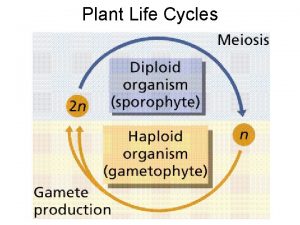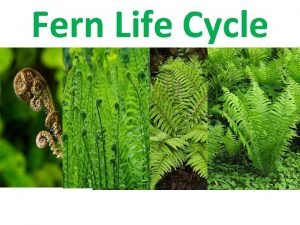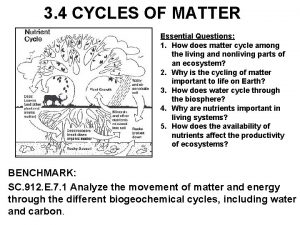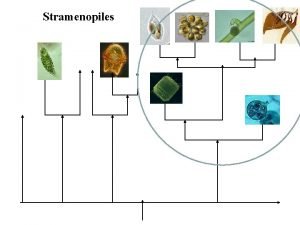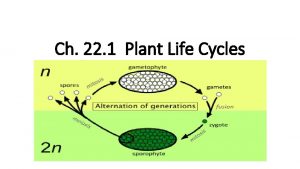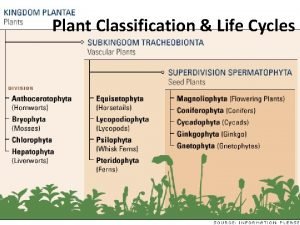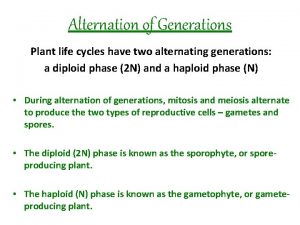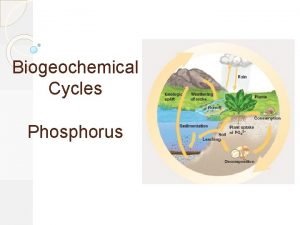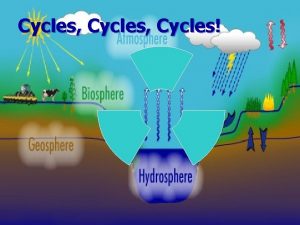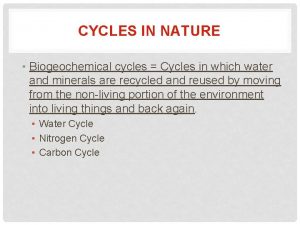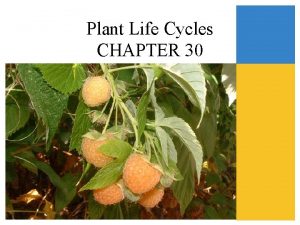Ch 22 1 Plant Life Cycles Alternation of




















- Slides: 20

Ch. 22. 1 Plant Life Cycles

Alternation of Generation • Plants complete their lif cycle by alternating between two phases • Phase 1: diploid plantbody that produces spores ……. Two copies of chromosomes (2 n) • Phase 2: haploid plant body that produces gametes…. . One copy of each chromosome (n) • Alternates between diploid and haploid phases

Alternation of Generation • Diploid phase: begins with a fertilized egg…. Zygote • Zygote: divides by mitosis and grows into a mature sporophyte (2 n) • Sporophyte: spore producing plant that has specialized cells that divide by meiosis to produce haploid spores (n)

Sporophyte • Sporophyte: divides by meiosis to produce haploid spores (n) • Cell division by meiosis reduces chromosomes by ½… 2 n to n

Meiosis

Gametophyte • Spores mark the beginning of the haploid phase on the plants life cycle (n) • Spores divide by mitosis and grow into mature Gametophytes • Mature gametophytes produce gametes (sperm and eggs) by mitosis • Sperm and egg meet…. . Fertilization takes place • Cycle continues with a new sporophyte


Life cycles • Different plant groups have their own version of alternation of generation • Sporophyte and gametophyte generations are different for: • Non-vascular plants • Seedless vascular plants • Seed plants

Nonvascular plants: Moss • Nonvascular: only plant where the ganetophyte phase is dominant • Green leaf-like structures are the gametophyte generation • Stalk like structures with capsule: sporophyte generation

Moss • Capsule: contains spore-producing sac: sporangia • When the spores are mature: capsule opens and spores disperse • If spore land in a favorable spot: it will grow into a gametophyte • Moss gametophyte produce gametes in special reproductive structures • Male structure: produces 100’s of sperm • Female structure: produce a single egg • When water is present: sperm swim toward an egg and join: Fertilization • After fertilization, the sporophyte phase begins again


Seedless Vascular plants: ferns • Sporophyte is the dominant phase for all vascular plants • The fern structure that is recognizable: sporophyte phase • Sori: sporangia (spore producing sacs) are on the underside of the leaf • Sori look like brown dots on the ferns fronds (leaves) • Once mature, spores are released and develop into a gametophyte

Ferns • Prothallus: fern gametophyte • Small plant body that anchors itself to the soil by rhizoids • Prothallus contain special reproductive structures that produce: sperm and eggs • When water present: sperm is released and swim toward an egg • When fertilization occurs (egg & sperm join): zygote forms • Zygote grows above the prothallus: turns into the sporophyte • Fiddleheads: newly forming fronds • Once mature, the sporophyte will produce sori and the cycle continues


Seed Plants: Conifer’s life cycle • Sporophyte is the familiar form of seed plants • Seed plants produce 2 types of spores: develop into male and female • gametophytes • Seed plants gametophytes are microscopic • Pine tree: typical conifer sporophyte • Produce two kinds of cones: male cone and female cone • Female cone: each scale has 2 ovules that produce spores. One will • develop into a microscopic female gametophyte, & one dies • Male cones: produce pollen grains which are tiny male gametophytes


Conifers • • • Male cones release clouds of pollen in the spring Pollen lands and sticks to a female cone Pollination occurs when pollen reaches the small opening of an ovule After pollination, eggs are produced in the ovule and a pollen tube begins to grow from the pollen grain toward the egg In pine species, it takes one year for the pollen tube to reach the egg Two sperm develop in the pollen grain and travel down the tube to the egg Sperm of seed plants do not have flagella One sperm fertilizes an egg, forming a zygote, then develops into an embryo Once mature, the scale opens and the seed is released: sporophyte pine seedling



 Plant life cycles and alternation of generations
Plant life cycles and alternation of generations Fern life cycle
Fern life cycle Poems about life cycles
Poems about life cycles Rvguev
Rvguev Life cycle of a bird
Life cycle of a bird Section 26.3 life cycles of stars
Section 26.3 life cycles of stars What is charted on an hr diagram?
What is charted on an hr diagram? Fadlife
Fadlife General fungal life cycle
General fungal life cycle Chapter 13 meiosis and sexual life cycles
Chapter 13 meiosis and sexual life cycles 4 cycles of life
4 cycles of life Chapter 13 meiosis and sexual life cycles
Chapter 13 meiosis and sexual life cycles Ectocarpus
Ectocarpus Strict alternation
Strict alternation Strict alternation in os
Strict alternation in os Phonology process
Phonology process Ganetophyte
Ganetophyte Alternation in phonology
Alternation in phonology Alternation theorem in dsp
Alternation theorem in dsp Alternation of generations
Alternation of generations Alternation of generations
Alternation of generations
